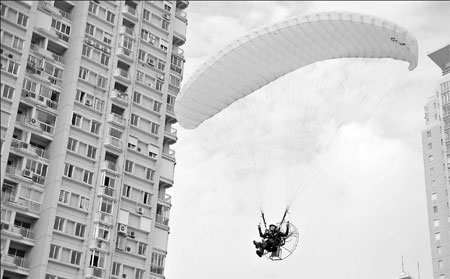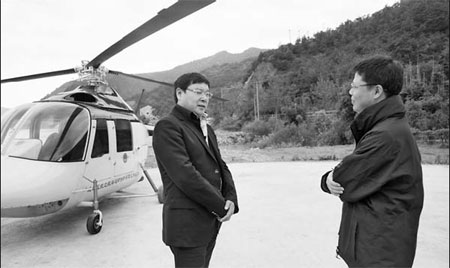Sky's the limit for owners of private jets
|
Chen Bin uses a powered parachute to take him to the sky. Chen, 41, a life insurance agent from Wenzhou in Zhejiang province, likes flying and photography. Photos Provided to China Daily |
|
Guan Hongsheng (left), a tycoon in Wenzhou, set up Wenzhou Lucheng Hailukong Club in 2008 in the city to "introduce a healthy and challenging lifestyle" to his business friends. |
Nouveau riche crave thrill of speed to replace 'tedious routine', report Yu Ran and Wang Ying in Shanghai.
Entrepreneurs who made their fortune by producing ordinary items for everyday life are becoming more flamboyant in how they spend their wealth.
Swish clothes, flashy houses and luxury cars are not enough, it seems, and the rich are now snapping up yachts, racing motorcycles and helicopters.
"We need the thrill to take our minds off the tedious routine of business life," said Guan Hongsheng, 44, founder of a company that makes clothes, hats, shoes and construction supplies for export to the US and Europe.
Like many other tycoons in Wenzhou, Zhejiang province, Guan has a keen nose for a business opportunity. Along with his colleagues, Guan set up the Wenzhou Lucheng Hailukong Club in 2008 to "introduce a healthy and challenging lifestyle" to the rich elite of their hometown. The club is dedicated to racing motorcycles, boating and flying helicopters.
Guan owns, among other luxuries, a BMW motorcycle, three helicopters valued at over 5 million yuan ($780,000) and three yachts. His exploits made headlines in the province this year when he and a friend, a club member, were caught flying two Rotorway Exec 162F helicopters for 20 minutes without official approval, something the moneyed class calls black flying. Both were fined 20,000 yuan.
"It was just for fun," Guan said. "Nobody got hurt."
To be cleared to fly, aircraft must be registered with the local office of the Civil Aviation Administration of China, which checks that the model is approved for Chinese airspace. Pilots also have to submit flight plans for every journey, including the time and route.
Late last year a circular issued jointly by the State Council and the Central Military Commission said the country's low-altitude airspace would be partly opened to private flights. This was to promote general aviation - the use of aircraft other than those flown by airlines, the military and police.
Compared with the US, the ratio of general aviation aircraft to population is low.
"Demand is growing rapidly for private air services among wealthy people, but the administrative restriction remains," said Lu Yongguang, an industrial analyst with Central China Securities.
There were 1,010 small aircraft registered on the mainland at the end of last year. The US, the world's largest general aviation market, has more than two-thirds of the world's 330,000 general aircraft.
"The reason for the gap is restricted airspace," Yao said, because restrictions on business jets and pilot training are severe.
But Yao said more low-altitude aviation is likely, especially as more business people have started to buy private jets and a growing number want to learn to fly.
Guan, who flies helicopters, said that the application process must be simplified. "The regulations are outdated and need to be reviewed," he said.
In August the Civil Aviation Administration of China also decreed Alxa and Genhe of the Inner Mongolia autonomous region to be test areas.
In March the head of the administration, Li Jiaxiang, said low-altitude airspace would be opened up gradually in the provinces of Guangdong, Hainan, Heilongjiang and Jilin.
"This is part of China's plan to open part of its low-altitude airspace over the next five to 10 years for commercial aviation," said Yao Jun, an analyst at China Merchants Securities.
"Sooner or later the sky will be open to us private helicopter owners. We fly helicopters because we love doing it; there are no sinister, illegal motives."
At the moment, Guan has a student pilot license that allows him to fly alongside an instructor. There is a one-off lesson fee of 10,000 yuan and a charge of 380 yuan an hour.
"Normally about 10 of us share the fees of hiring an instructor by flying my helicopters for one or two days over the suburbs of Wenzhou. I don't want to make money from my helicopter, but to get young people along for some quality leisure."
The club's motorcycling and motorboat activities add to its inventory of summer fun.
Guan's quest for a life of excitement led him to sports "with high costs and risks". By the time he was 40 he had licenses to drive racing cars, to operate motorboats, to sail yachts, and to fly planes as a student.
Yu Zhiwu, 37, a club member and organizer, followed in Guan's tow and became a fan of motorboats and helicopters too. Such pastimes demand passion, time and a lot of money, he said.
As the moneyed class of Wenzhou grows, the club's membership has grown, too. It now has more than 100 members, including 80 percent from the so-called rich second generation.
There is even an altruistic side to this club for the rich.
"We want to get young people out of unhealthy karaoke bars," Yu said.
Since buying helicopters in the pursuit of pleasure is obviously something few can afford, others look for alternatives that are cheaper but that still give them a buzz.
Chen Bin, 41, a life insurance agent from Wenzhou who likes flying and photography, spent nearly 100,000 yuan so he could take to the skies using a powered parachute.
"Flying and taking photos that way is much safer than flying a helicopter," said Chen, who became interested in aerial photography four years ago.
"If you have engine problems with the parachute you can simply glide to a safe landing."
Obtaining a license to operate the powered parachute took only a month, Chen said, compared with the two years normally required to obtain a helicopter pilot's license.
Chen received much media attention recently after he flew with his powered parachute to take some of the first pictures of the aftermath of the high-speed-train crash near Wenzhou in July that killed 40 people.
He also heads a nongovernmental air rescue team, one of the first amateur rescue groups in China. "We want to expand this leisure hobby of flying to helping people in accidents."
Chen is also the organizer of a paragliding club with over 60 members, and on weekends and during holidays, club members use low-altitude airspace to feel the freedom of the sky. He acknowledges that this flying is done without official approval.




















